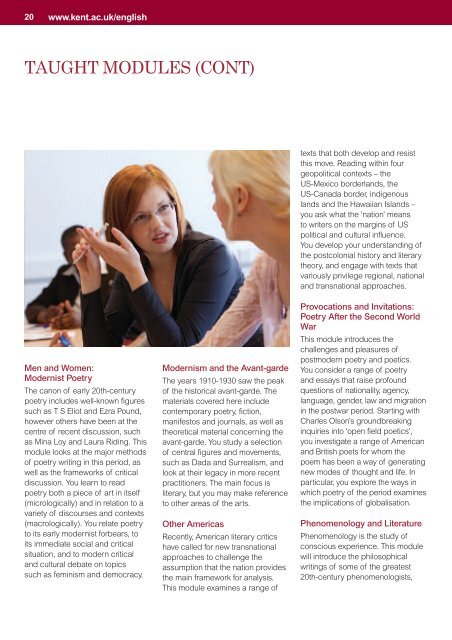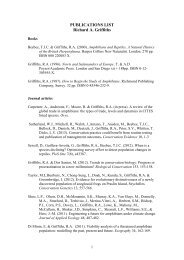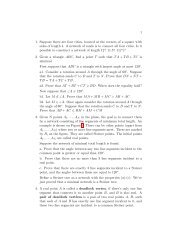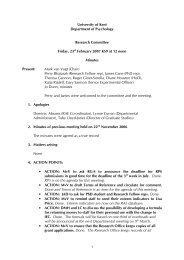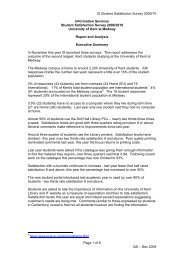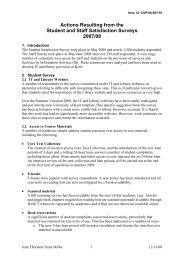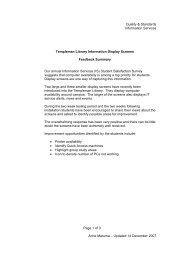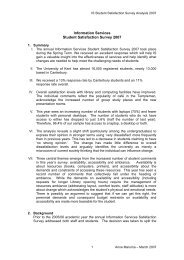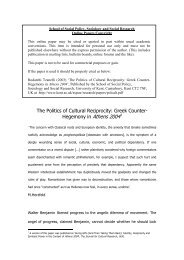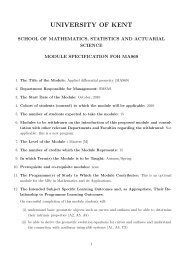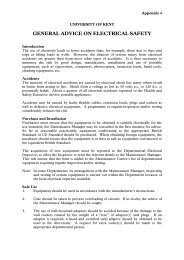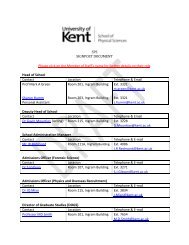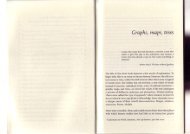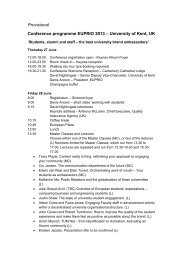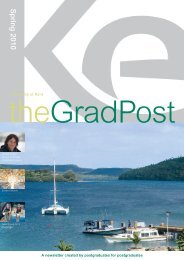SCHOOL OF ENGLISH - University of Kent
SCHOOL OF ENGLISH - University of Kent
SCHOOL OF ENGLISH - University of Kent
Create successful ePaper yourself
Turn your PDF publications into a flip-book with our unique Google optimized e-Paper software.
20<br />
www.kent.ac.uk/english<br />
TAUGHT MODULES (CONT)<br />
texts that both develop and resist<br />
this move. Reading within four<br />
geopolitical contexts – the<br />
US-Mexico borderlands, the<br />
US-Canada border, indigenous<br />
lands and the Hawaiian Islands –<br />
you ask what the ‘nation’ means<br />
to writers on the margins <strong>of</strong> US<br />
political and cultural influence.<br />
You develop your understanding <strong>of</strong><br />
the postcolonial history and literary<br />
theory, and engage with texts that<br />
variously privilege regional, national<br />
and transnational approaches.<br />
Men and Women:<br />
Modernist Poetry<br />
The canon <strong>of</strong> early 20th-century<br />
poetry includes well-known figures<br />
such as T S Eliot and Ezra Pound,<br />
however others have been at the<br />
centre <strong>of</strong> recent discussion, such<br />
as Mina Loy and Laura Riding. This<br />
module looks at the major methods<br />
<strong>of</strong> poetry writing in this period, as<br />
well as the frameworks <strong>of</strong> critical<br />
discussion. You learn to read<br />
poetry both a piece <strong>of</strong> art in itself<br />
(micrologically) and in relation to a<br />
variety <strong>of</strong> discourses and contexts<br />
(macrologically). You relate poetry<br />
to its early modernist forbears, to<br />
its immediate social and critical<br />
situation, and to modern critical<br />
and cultural debate on topics<br />
such as feminism and democracy.<br />
Modernism and the Avant-garde<br />
The years 1910-1930 saw the peak<br />
<strong>of</strong> the historical avant-garde. The<br />
materials covered here include<br />
contemporary poetry, fiction,<br />
manifestos and journals, as well as<br />
theoretical material concerning the<br />
avant-garde. You study a selection<br />
<strong>of</strong> central figures and movements,<br />
such as Dada and Surrealism, and<br />
look at their legacy in more recent<br />
practitioners. The main focus is<br />
literary, but you may make reference<br />
to other areas <strong>of</strong> the arts.<br />
Other Americas<br />
Recently, American literary critics<br />
have called for new transnational<br />
approaches to challenge the<br />
assumption that the nation provides<br />
the main framework for analysis.<br />
This module examines a range <strong>of</strong><br />
Provocations and Invitations:<br />
Poetry After the Second World<br />
War<br />
This module introduces the<br />
challenges and pleasures <strong>of</strong><br />
postmodern poetry and poetics.<br />
You consider a range <strong>of</strong> poetry<br />
and essays that raise pr<strong>of</strong>ound<br />
questions <strong>of</strong> nationality, agency,<br />
language, gender, law and migration<br />
in the postwar period. Starting with<br />
Charles Olson’s groundbreaking<br />
inquiries into ‘open field poetics’,<br />
you investigate a range <strong>of</strong> American<br />
and British poets for whom the<br />
poem has been a way <strong>of</strong> generating<br />
new modes <strong>of</strong> thought and life. In<br />
particular, you explore the ways in<br />
which poetry <strong>of</strong> the period examines<br />
the implications <strong>of</strong> globalisation.<br />
Phenomenology and Literature<br />
Phenomenology is the study <strong>of</strong><br />
conscious experience. This module<br />
will introduce the philosophical<br />
writings <strong>of</strong> some <strong>of</strong> the greatest<br />
20th-century phenomenologists,


